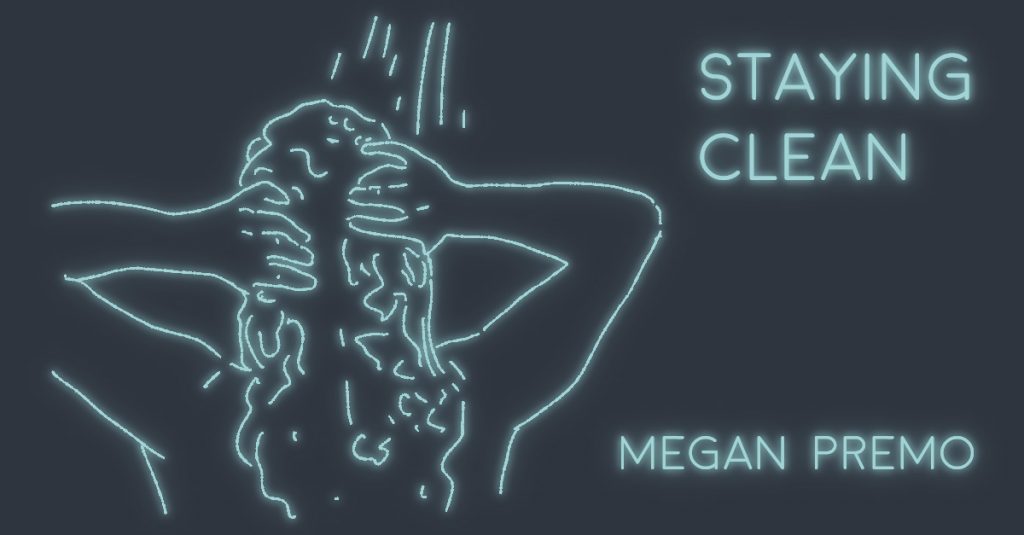“It’s soap and shampoo and conditioner,” my father said. The shared hardship of our poverty was intimacy, foreign and beloved, and I took scraps of it from his hand with starving, canine snaps. My laughter was one of these, meant to please him. Yes, we will suffer through this multi-purpose soap together, you and I.
The foamless rectangle was greenish-blue, an institutional color, not a tropical one, and it smelled like something meant to clean dishes or toilets or floors, not human hair, not fourteen-year-old girls’ bodies. It was also kindred with household cleaners in that Dawn or 409 or Pine-Sol would have left my hair in a similar uncombable nest. The cessation of vanity was liberating.
We were bachelors and it was glorious.
We ate expired, boxed “tuna dinner” which my father bought at the Canned Food Warehouse–same as the soap–and Cap’n Crunch with red and green Crunchberries, though Christmas was six months ago, and we laughed and said, “Christmas in July!” as we tore the roofs of our mouths to ribbons.
Because my father’s parole officer might visit unannounced, and I didn’t want him to go back to prison, nor did I want to move back into my mother’s apartment with her and my father-forsaken brother and my grandmother—who got her own bedroom because “when you start paying half the rent, you can have your own fucking bedroom,”—after my father passed out, I collected his empty Schlitz cans and placed them in a bag under the sink.
The cans were worth five cents apiece. The hour-long bus ride was $1.15—which meant I had exactly $3.75 to spend at the Howling Frog in Oldtown, feeling cosmopolitan and adult as I sipped hibiscus tea with my friends, less tart with every hot-water refill from the tipless, sullen barista.
My father didn’t discover the missing cans until he ran out of money, which didn’t take very long because my father ran out of money often. He didn’t call me a dumbshit or a smartass or a selfish asshole and this was worse than the diluted oversaturation of my mother’s yelling. Tired and wise, he said, “Can I talk to you for a sec?” and I said, “Yeah, sure, what’s up?,” like it was no big thing but I felt a tectonic shift: My father was going to become my father instead of my friend and he did not deserve to do this even though I wanted him to, a little.
I still didn’t want to move back to my mother’s house, to my brother’s booming NWA and my grandmother chain-smoking in front of The Price is Right, so my only petulance was to toss loose cans under the sink and hide the roll of garbage bags the transitional housing people had given us as part of a box of donated household items a volunteer had smiled over and said would help us “set up shop”. These did not, obviously, include shampoo and conditioner.
Our duplex was way out in Oregon City because it was the first one available to the housing authority waiting list, me being the reason my father was prioritized because single, male convicts were invisible unless cloaked with a child’s need. This was the “place of our own” my father had promised through the glass, through the telephone I held slightly away from my ear and mouth because the desperation of the people in the waiting room had seemed viral and I did not yet know that this sickness was already dormant in me.
The alternative high school at the community college was called “Dumb Guy School” for a reason, and though I went there every day, the doomed and pregnant other girls were not my friends and I snarled at every “My baby-daddy gonna,” because these girls were too stupid to know this age-old method of keeping a man never worked, they were not special enough to be exceptions and they would be raising their babies alone or with the help of their own resentful single mothers. I had a bright mind and thus gave the plump, sympathetic teacher an opportunity to converse rather than supervise, which was more rewarding even if she knew I wasn’t learning anything from the 5th grade level worksheet packets they gave us because I had been in Honors everything up until I dropped out. Ten pages of my “Social Studies” packet were left, multiple choice questions I didn’t need to read the material to answer because I already knew why the Civil War was fought and who Abraham Lincoln was, so it only took me ten minutes to be out the door when this teacher said, “Whoever finishes their packet first can leave early.”
I arrived at the duplex to the steam of a recent and vacated shower, ripe with reconstituted mildew, a faint whiff of soap-shampoo-conditioner and a furtive, ominous shuffle I assumed was my father masturbating until it took too long. I yelled, “Home early!” because maybe we could watch Jeopardy together and I could marvel at his mastery of trivia and tell him that I was reading 1984. I didn’t recognize the warning, burning cat-piss smell at the end of the hall so I said, “Hey, Dad—” as I pushed his bedroom door open and he whispered, “No,” like this was inevitable, and looked up at me from the needle buried in the bruised and angry crook of his arm, skin tented beneath a rubber belly-button knot of shame and regret and his resigned acceptance of himself.
I said, “Next time, lock the door.”

